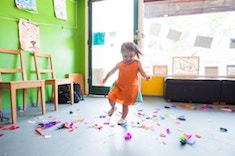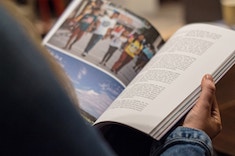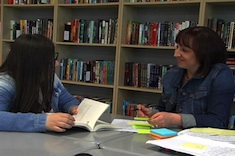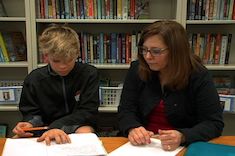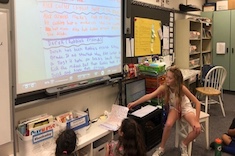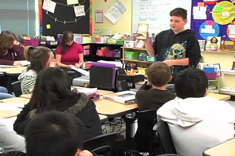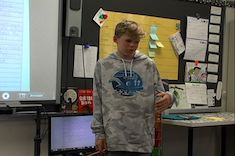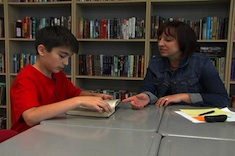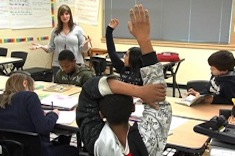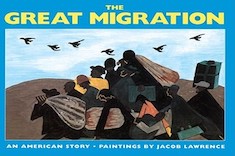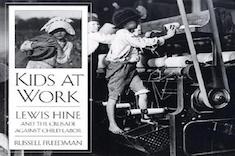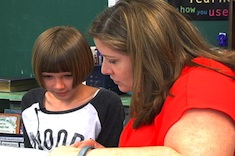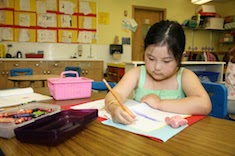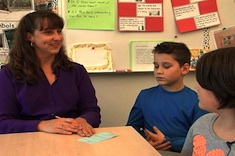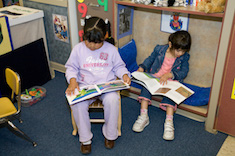Library
Choice Literacy Articles & Videos
The Choice Literacy library contains over 3,000 articles and 900 videos from 150+ contributors. Classic Classroom and Literacy Leadership subscribers have access to the entire library. Content is updated continuously, with five to six new features published each week.
Latest Content
The Big Fresh October 6, 2018 Get Under the Ball
We look at struggling, striving, and stuck learners in this week’s Big Fresh.
Word Walls in Preschool? Yes, You Can!
A word wall in preschool?! Shari Frost helps a teacher meet this impossible edict, and has a lot of fun in the process thinking about how our youngest learners acquire word knowledge.
Fear of Reading
Gretchen Schroeder reflects on why some of her students have developed a fear of reading by the time they reach high school.
Moving Beyond Pokemon: Conferring with Clover
Bitsy Parks works with a first grader stuck on writing about Pokemon characters. She uses other writing from Clover to nudge her to try something new.
High Standards and Struggling Learners
Mark Levine explains why high standards can be helpful even for students who are struggling in his middle school classroom.
The Big Fresh September 29, 2018 The “One Thing” Mindset
We look at how to confer for reflection and action in this week’s Big Fresh.
Cause and Effect: Conferring with Olivia
Christy Rush-Levine confers with Olivia about the principle of cause and effect in the novel she is reading.
Conferences Between Middle School Parents and Teachers
Parents of middle school students are often bewildered at how best to deal with their child’s unresponsiveness. Jennifer Schwanke explains how teachers can construct conferences with middle school parents that foster reflection, action, and shared goals.
Linking Pictures and Text: Conferring with Ava
Katrina Edwards begins her conference with first grader Ava by having her share what she learned from a picture walk through a simple text, and then she helps her use pictures to decode text while reading.
Four-Step Reading Conferences
Christy Rush-Levine emphasizes “reflaction” in her reading conference protocol—reflection that leads to action for her students. Download the Reflaction (reflection + action) Form to use with students.
The Big Fresh September 22, 2018 Sometimes We Should Just Clap
We look at student-led minilessons in this week’s Big Fresh.
Planning a Student-Led Minilesson
Franki Sibberson helps Lucas plan his minilesson for his fifth-grade classmates on how to connect words and facts from two different sources.
Student-Led Minilessons in Fifth Grade
Franki Sibberson initiates student-led minilessons, and finds the process takes her literacy workshops to a new level of independence and energy.
Student-Led Minilessons in Middle School
One student’s request to lead a minilesson is a catalyst for Mark Levine to see the value of student-led minilessons as an assignment for all in his middle school classroom.
Student-Led Minilesson: Connecting Facts from Different Sources
Lucas leads a minilesson in Franki Sibberson’s fifth-grade class on connecting facts from different sources.
The Big Fresh September 15, 2018 Inviting the Stranger In
We have some fresh takes on teaching history and biography in this week’s Big Fresh.
History Through a Child’s Eyes: Conferring with Omar
Christy Rush-Levine confers with Omar, who is reading The Rock and the River. The book is a fictional account of a tumultuous time in civil rights history, considering protests through a child’s eyes.
Balancing Whole-Class and Independent Reading in Middle School
The choice between whole-class novels or independent reading can be a false one in many middle school classrooms. Katie Doherty’s sixth graders discuss their reading together of a novel in verse, and Katie explains how some shared whole-class texts can support independent reading.
Expanding Black History Month Reading
A heavy sigh from a student is a cue to Shari Frost that he has heard the same Martin Luther King picture book biography one too many times in February. She shares her top picture book picks for expanding children’s awareness of black history all year long.
Russell Freedman Book Clubs
Mark Levine finds Russell Freedman book clubs are a great way for his middle school students to deepen their understanding of history and empathize with young people who have lived through previous eras.
Picture Book Biographies
Stella Villalba shares some of her favorite new picture book biographies for bringing history to life for young learners, with a focus on perseverance.
The Big Fresh September 8, 2018 Mothers of the Brides
We consider the connections between personal history and literacy in this week’s Big Fresh.
A Poem About Lost Friendship: Conferring with Estelle
Estelle shares a poem she has written about lost friendship with her teacher, Katherine Sokolowski. She captures the fickle nature of fifth-grade relationships among girls. Katherine connects the cadence of the writing to the style of The Crossover, and helps Estelle find possibilities for more writing.
Ohana Means “Family”
Suzy Kaback is startled to see a picture of her deceased father on the wall when she visits her daughter’s seventh-grade classroom. It’s the start of learning about the power of ohana in schools.
Does the Pencil Still Have Power?
Ruth Ayres wonders if the pencil still has power, taking readers through a whirlwind history of the writing tool in her life, schools, and the world.
The Big Fresh September 1, 2018 Listening to Children
We consider literacy foundations in this week’s Big Fresh.
Message from the Moon
Shirl McPhillips crafts a message from the moon about tone in poetry and school in her latest poem and companion essay.
Avoiding Flat Tires
Jen Schwanke gets berated by a tire shop repair guy for ignoring routine maintenance needs on her bike. That gets her thinking about what needs routine maintenance in elementary classrooms.
Reading Partners: Process Discussion
Gigi McAllister helps fourth-grade reading partners evaluate their success and areas to work on in their partnership.
Building Routines
Bitsy Parks teaches the foundations of first-grade classroom life through minilessons early in the year.
Browse Content By
Type
Category
- Assessment Tools
- Big Fresh Archives
- Booklists
- Choice Numeracy
- Classroom Design
- Common Core
- Community Building
- Conferring
- Content Literacy
- Digital Literacy
- English Language Learners
- Equity
- Family Relations
- Free Samples
- Guiding Groups
- Leadership
- Literacy Coaches
- Mentor Texts
- Minilessons
- New Teacher Mentors
- Podcasts
- Poetry
- Quote Collections
- Reading Strategies
- Self Care
- Struggling and Striving Learners
- Talking and Listening
- Teacher Study Groups
- Teaching Reading
- Teaching Writing
- Word Study and Vocabulary
Author
- Melissa Quimby
- Nawal Qarooni
- Gwen Blumberg
- Julie Cox
- The Lead Learners
- Hannah Tills
- Josie Stewart
- Ruth Metcalfe
- Mallory Messenger
- Becca Burk
- Jodie Bailey
- Vivian Chen
- Mary Brower
- Tiffany Abbott Fuller
- Stephanie Affinito
- Ruth Ayres
- Leigh Anne Eck
- Heather Fisher
- Shari Frost
- Julie Johnson
- Suzy Kaback
- Gigi McAllister
- Shirl McPhillips
- Melanie Meehan
- Cathy Mere
- Debbie Miller
- Tara Barnett and Kate Mills
- Tammy Mulligan
- Dana Murphy
- Bitsy Parks
- David Pittman
- Brenda Power
- Heather Rader
- Matt Renwick
- Mandy Robek
- Christy Rush-Levine
- Gretchen Schroeder
- Jen Schwanke
- Brian Sepe
- Katherine Sokolowski
- Stella Villalba
- Jennifer Vincent
Grade Level
Choice Literacy Membership
Articles
Get full access to all Choice Literacy article content
Videos
Get full access to all Choice Literacy video content
Courses
Access Choice Literacy course curriculum and training


